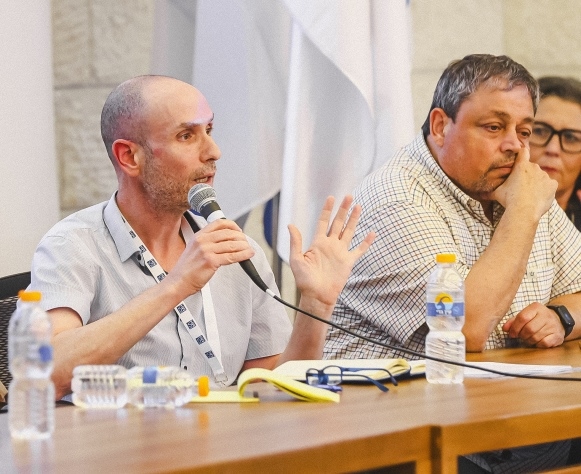Dr. Liron Nathan from the Social and Welfare Audit Division presented a survey of the audit's findings before senior trauma treatment professionals regarding mental health treatment following the events of October 7th and the Swords of Iron War
Dr. Liron Nathan, Audit Director at the Welfare, Employment and Social Equality Department of the Social and Welfare Audit Division, represented the Office of the State Comptroller and Ombudsman in a professional conference dealing with the effects of the events of October 7th and the Swords of Iron War in the field of mental health (12-13.5.2025).
The conference, held at the Hebrew University, included lectures and sessions presenting updated studies conducted by leading researchers in the field of mental trauma during the past year and a half.
Dr. Nathan said that "Findings from many of the studies presented matched and even reinforced the findings of the audit report we conducted in the matter, published in February 2025". "For example, surveys conducted by a similar methodology to the one we used indicated similar rates of post-trauma symptoms, depression and anxiety on clinical levels over time".
"Another finding presented, matching the report's conclusions, is that only about 200 adolescents were treated at the resilience center in Sderot – a figure that indicates disparities in the treatment in relation to the number of victims".
During the final part of the conference, Dr. Nathan took part in a professional panel dealing with the functioning of the mental health system in the reality of war. The CEO of the Israel Trauma Coalition, the Deputy Director of the Mental Health Division at the Ministry of Health, the Director of the Taazumot Center in the Mental Health Array of the Medical Corps, and the Ministry of Health's Chief Psychologist took part in the panel alongside him.
Dr. Nathan presented to the audience, which included researchers and senior professionals in the field of trauma treatment, the findings of the report that he had helped to write, on mental health treatment following the events of October 7th and the Swords of Iron War. He focused, among other things, on the following aspects:
- The rationale for making the report and the significance of conducting an audit during wartime.
- The lack of sufficient preparation for emergency in the field of mental health at the Ministry of Health, and the reliance upon volunteers, some of whom lack sufficient training or did not document their activity.
- A dearth of data regarding the number of people suffering from mental symptoms over time, the failure to monitor the number of patients, the lack of information about the completion of treatment and its effectiveness.
- A low number of patients in relation to the enormity of the damage – with an emphasis on the evacuees and children from Sderot, as well as the survivors from the Nova party.
- Prolonged waiting times for receiving mental health treatment at the HMOs.
"The audit report's findings aroused great interest", said Dr. Nathan. "The participants and the moderator emphasized the report's significant contribution, among other reasons due to the fact that it is based on validated data in matters where it is difficult to gather reliable information. It emphasized the need for the Ministry of Health to regularly gather information and monitor the population's mental condition, including treatment dropout rates and the reasons for this".
According to him, the discussion also raised the question of preparation for the future: "I related to the need to learn lessons from dealing with the evacuees, the formulation of a designated program for mental health at this time and also as a preparation for other states of emergency such as earthquake; the establishment of pools of volunteers who have undergone designated training, and the reinforcement of the cooperation and knowledge sharing between the parties providing treatment and rehabilitation services".












